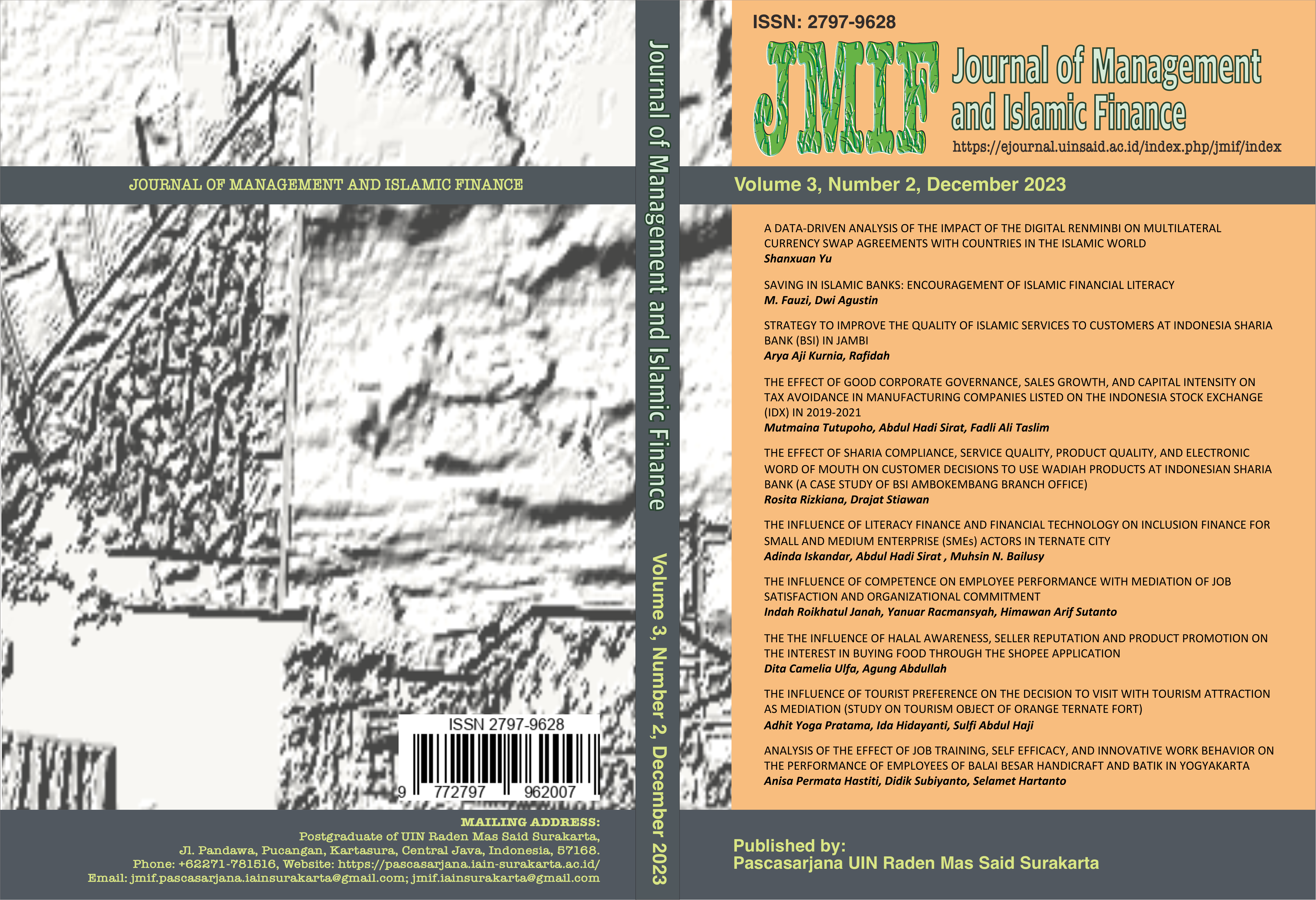SAVING IN ISLAMIC BANKS: ENCOURAGEMENT OF ISLAMIC FINANCIAL LITERACY
DOI:
https://doi.org/10.22515/jmif.v3i2.7334Keywords:
Saving, Islamic Bank, Islamic Financial LiteracyAbstract
Islamic banking in Indonesia has exhibited positive growth, although financial inclusion in the sector remains low at 9.06%. Islamic banks present an alternative for those seeking a financial institution that adheres to Islamic principles. The low level of Islamic financial inclusion is attributable to several factors, including the insufficient level of Islamic financial literacy at 8.93%. This research was a type of field research using a quantitative approach. The data used primary data obtained through the distribution of questionnaires to batik entrepreneurs in the Wiradesa Pekalongan sub-district. Samples were taken as many as 65 respondents based on the Slovin formula. The type of sampling technique used cluster proportional random sampling. The statistical tests used validity test, data reliability test, and t-test (t-test) to test the hypothesis. The results of the research on Islamic financial literacy variables have a positive and significant effect on interest in saving in Islamic banks, the significance value is 0.023 <0.05 and the t value (2,328) > t table (2,000).
Downloads
References
Awwala, M. A. F., Rinia, D. W. S., & Purwaningsih, A. E. (2018). Sharia Economics Edugame (SEE)”: Alternatif Pengembangan Pemahaman Literasi Keuangan Syariah. Jurnal Studi Agama Dan Masyarakat, 14(1).
Azwar, S. (1998). Metodologi penelitian. Pustaka Pelajar.
Dhzuhri P Izzun Khoirun Nissa, M. E., Dhzuhri P, M. E., & Khoirun Nissa, I. (2022). Peran bank syariah dalam berbagai aspek bagi masyarakat Indonesia. Jurnal Regkonisi Ekonomi Islam, 1(2), 180–185. https://doi.org/10.34001/jrei.v1i2.304
Frastuti, M., Pratama Putra, D., & Effendi, E. (2019). Peranan Komisaris dan Direksi Bank Syariah dalam Pengelolaan Dana Zakat dan ISR (Islamic Social Responsibility) di Indonesia. Akuntansi Dan Manajemen, 14(2). https://doi.org/10.30630/jam.v14i2.47
Gunawan, A., Asmuni, A., & Siregar, S. (2021). Islamic Financial Literacy and Financial Behavior: The case of Muhammadiyah Community in Medan City. Journal of Accounting and Investment, 22(3), 500–516. https://doi.org/10.18196/jai.v22i3.10043
Hidajat, T. (2015). Literasi Keuangan. STIE Bank BPD Jateng.
Ismanto, K. (2018). Literasi Masyarakat dan Dampaknya terhadap Minat Menjadi Nasabah Bank Syariah. Jurnal Human Falah, 5(1), 1–16.
Ismanto, W., Munzir, T., Tanjung, R., Lestari, L., & Ashari, E. (2022). The Influence of Marketing Mix On Purchase Decision. Dimensi, 11(1), 200–210.
Muhamad. (2014). Manajemen Dana Bank Syariah. Rajawali Press.
Mulyadi, H., & Triani, A. (2019). Peningkatan Pengalaman Keuangan Remaja Untuk Literasi Keuangan Syariah Yang Lebih Baik. Jurnal I-FINANCE, 5(1).
Musa, H., Musova, Z., Natorin, V., Lazaroiu, G., & Boďa, M. (2021). Comparison of factors influencing liquidity of European Islamic and conventional banks. Oeconomia Copernicana, 12(2). https://doi.org/10.24136/OC.2021.013
Nainggolan, B. (2016). Perbankan Syariah Di Indonesia. Rajawali Pers.
Neldawaty, R. (2018). Perbandingan Kinerja Bank Syariah Dan Bank Konvensional. Journal Development, 6(1), 61–69. https://doi.org/10.53978/jd.v6i1.92
Nurrohmah, R. F., & Purbayati, R. (2020). Pengaruh Tingkat Literasi Keuangan Syariah dan Kepercayaan Masyarakat terhadap Minat Menabung di Bank Syariah. Jurnal Maps (Manajemen Perbankan Syariah), 3(2). https://doi.org/10.32627/maps.v3i2.135
OJK. (2022). Siaran Pers Survei Nasional Literasi Dan Inklusi Keuangan Tahun 2022. Otoritas Jasa Keuangan, November, 10–12.
OJK. (2023). Data Survey Literasi dan Inklusi Keuangan tahun.
Setyowati, A., Harmadi, H., & Sunarjanto, S. (2018). Islamic Financial Literacy and Personal Financial Planning: A Socio-Demographic Study. Jurnal Keuangan Dan Perbankan, 22(1), 63–72. https://doi.org/10.26905/jkdp.v22i1.1625
SNKI. (2018). Literasi Keuangan. Strategi Nasional Keuangan Inklusif.
Suretno, S., & Bustam, B. (2020). Peran Bank Syariah Dalam Meningkatkan Perekonomian Nasional Melalui Pembiayaan Modal Kerja Pada Umkm. Ad-Deenar: Jurnal Ekonomi Dan Bisnis Islam, 4(01), 1. https://doi.org/10.30868/ad.v4i01.752
Sutisna, H. Y., & Saebani, B. A. (2018). Metode Penelitian. Pustaka Setia.
Widyastuti, S. (2019). Implementasi Etika Islam dalam Dunia Bisnis. In Cv Irdh. CV IRDH.
Yumanita, A. D. (2005). Bank Syariah. In Bank Indonesia : Seri Kebanksentralan (Issue 14). Pusat Pendidikan dan Studi Kebanksentralan Bank Indonesia.
Zaini, Rohmah, L., & Sujianto, A. E. (2019). Pendampingan Literasi Keuangan Syariah. Jurnal Pengabdian Kepada Masyarakat, 10(1).
Zainuldin, M. H., & Lui, T. K. (2020). Earnings management in financial institutions: A comparative study of Islamic banks and conventional banks in emerging markets. Pacific Basin Finance Journal, 62. https://doi.org/10.1016/j.pacfin.2018.07.005
Downloads
Published
Issue
Section
Citation Check
License
Copyright (c) 2023 M. Fauzi FAUZI, Dwi Agustin

This work is licensed under a Creative Commons Attribution-ShareAlike 4.0 International License.
Authors who publish with this journal agree to the following terms:
- Authors retain copyright and grant the journal right of first publication with the work simultaneously licensed under a Creative Commons Attribution License that allows others to share the work with an acknowledgement of the work's authorship and initial publication in this journal.
- Authors are able to enter into separate, additional contractual arrangements for the non-exclusive distribution of the journal's published version of the work (e.g., post it to an institutional repository or publish it in a book), with an acknowledgement of its initial publication in this journal.
- Authors are permitted and encouraged to post their work online (e.g., in institutional repositories or on their website) prior to and during the submission process, as it can lead to productive exchanges, as well as earlier and greater citation of published work.






